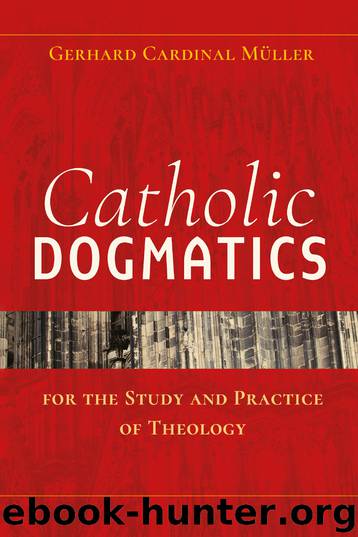Catholic Dogmatics by Gerhard Ludwig Müller

Author:Gerhard Ludwig Müller
Language: eng
Format: epub
Publisher: The Crossroad Publishing Company
2. Creation Realized through Evolution and the History of Human Freedom
The creative activity of God is the continuous inclusion of the world into God’s actuality and its realization through God. But this then also includes that the world, once realized, is also active by means of its immanent principles and that the concrete phenomena in the world can be traced to this activity of immanent principles. Only the human mind has any chance of attaining to the knowledge of its transcendent causes. God has not abandoned his creative activity to the immanent causalities of the world, but rather he effects his reality of creation in the midst of the created causes by bearing the world’s existence and operation and by granting the world self-empowerment.
Within the most general basic principles of the world there must then be a duality of that which is organized and that which organizes itself: the duality of matter and spirit. Added to this is the coefficient of temporality. The undivided act of creation is effective in the created world only in the manner of evolution.
That, regarding individuals, origin and expiration are general attributes of concrete and finite things cannot be disputed. The key question revolves around whether origin and expiration of genera was integral from the very outset or whether there has been a constancy of the species. If “creation” is God’s timeless actuality and presence for created things and not simply identical with what once was at some, somehow chronologically ascertainable beginning of our universe (understood empirically, not metaphysically), then a cognitive advance can be made in this respect.
The fact is that there never is only pure matter. Even what is customarily referred to in the natural sciences as prime matter is not identical with what is meant by materia prima in philosophy. The prime matter which is comprehensible in terms of the natural sciences was also always formed, determined and organized matter. This matter, already somehow organized, i.e., matter formed into a unit of meaning, is in the process of transition to new modalities and singularities.
If natural science refers to matter as inorganic matter, that is legitimate, and at the same time one can treat matter itself solely in terms of quantity, methodologically disregarding its other aspects. But the essence of matter is in this way by no means completely comprehended. The usual way of posing the question always assumes that it is already clear what matter is, while it must be first shown in a complicated argument where there is something called mind in the first place and what mind can be. A more precise analysis of human knowledge and the formation of terms shows that matter is not at all ascertainable. Matter has always been understood by the human intellect as matter of an individual being. Hence, the term matter, in itself, is formed by an abstraction from a concretely existing thing, drawn by an abstracting intellect, in the process of knowledge acquisition is impossible to ignore. In reality, therefore, man has
Download
This site does not store any files on its server. We only index and link to content provided by other sites. Please contact the content providers to delete copyright contents if any and email us, we'll remove relevant links or contents immediately.
Joan of Arc by Mary Gordon(4109)
Victory over the Darkness by Neil T. Anderson(2868)
The Gnostic Gospels by Pagels Elaine(2531)
Devil, The by Almond Philip C(2331)
The Nativity by Geza Vermes(2230)
The Psychedelic Gospels: The Secret History of Hallucinogens in Christianity by Jerry B. Brown(2157)
Going Clear: Scientology, Hollywood, and the Prison of Belief by Lawrence Wright(1985)
Going Clear by Lawrence Wright(1967)
A TIME TO KEEP SILENCE by Patrick Leigh Fermor(1911)
Barking to the Choir by Gregory Boyle(1821)
Old Testament History by John H. Sailhamer(1814)
Augustine: Conversions to Confessions by Robin Lane Fox(1772)
A History of the Franks by Gregory of Tours(1728)
A Prophet with Honor by William C. Martin(1725)
The Bible Doesn't Say That by Dr. Joel M. Hoffman(1680)
The Knights Templar by Sean Martin(1655)
by Christianity & Islam(1632)
The Source by James A. Michener(1613)
The Amish by Steven M. Nolt(1573)
